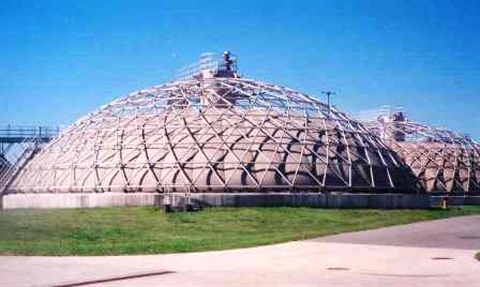Wastewater Treatment

The Division of Sewerage and Drainage operates two wastewater treatment plants, Jackson Pike and Southerly. Wastewater from Columbus and 25 contracting suburban communities flows to one of these two plants, who combined treated an average of 188 million gallons per day in 2020, a year with rainfall of 44". The photo shows the sludge digesters at Jackson Pike, which are visible from I-71 south of downtown Columbus.
Other statistics on wastewater treatment in Columbus can be found in our most recent Department of Public Utilities Annual Report.
Learn more about the treatment process at Jackson Pike.
Understanding Our Sewer System
There are three types of sewers:
- Combined sewers carry both sewage and rain water to wastewater treatment plants
- Separate sanitary sewers carry sewage from homes and businesses to wastewater treatment plants
- Storm sewers convey rain water from streets, rooftops and parking lots to nearby streams
An Old Problem
Our sanitary sewer system works well most of the time, but rain water and snow melt can seep into the system and overload it. When this occurs, the amount of water entering the sanitary sewer system exceeds the system's capacity to hold it.
A New Approach
Columbus has developed a new approach to eliminate sanitary sewer overflows. Instead of simply storing excess water that seeps into the sanitary sewer system when rain falls and snow melts, Blueprint Columbus addresses the source of the problem. View the Report Blueprint(PDF, 21MB) approved by Ohio EPA 12/1/15.
Blueprint Columbus
Blueprint Columbus takes all of the regulatory challenges of complying with the Clean Water Act into consideration and uses green infrastructure to meet these challenges and efficiently achieve water quality goals.
Get Your Garden in Full Bloom with Com-Til
Com-Til products are organic fertilizers and soil conditioners used for mulching, gardening, potting, transplanting and breaking up tough, clay soil. Add valuable organic matter & nutrients to give your greens a boost or use as a decorative mulch to retain moisture. It is one of the best-kept secrets for improving soil health, growing a greener lawn and getting your garden in full bloom.
Keep It Clean
Prevent water pollution through everyday living with simple tips to keep our water clean. Simple steps you can take at home such as: disposal of household hazardous waste, yard waste (including pet waste) and cooking grease; making simple lawn care choices; reducing stormwater runoff; maintaining cars & driveways properly; litter clean-ups & more.